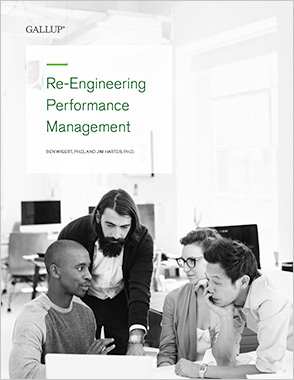Story Highlights
- Only 14% of employees strongly agree their performance reviews motivate them
- 22% of employees have cried at least once from a performance review
- These tips can help managers give reviews that motivate, not devastate
All over the world, managers and workers are gearing up for their end-of-year performance reviews.
Few of those reviews will do your company any good. Some will be actively harmful.
Only 14% of employees strongly agree that their performance reviews motivate them to do better work, and few performance reviews encourage employees to do work that's in the company's best interest rather than the individual's.
On top of that, 95% of managers are dissatisfied with their review process too.
"People tend to see performance reviews as inaccurate and unfair because they don't reflect the most important aspects of their job and are easily influenced by manager bias," says Dr. Ben Wigert, Director of Research and Strategy for Gallup's Workplace Management Practice, who discussed getting progress reviews right in a recent Called to Coach podcast.
Small wonder that performance reviews have made 22% of office workers cry at least once, according to a survey sponsored by Adobe.
Year-end reviews shouldn't do that.
Yours don't have to, but the clock is ticking. Your HR team and managers can't engineer a system overnight that turns performance evaluations into a cultural, motivational, recruitment and financial asset like they should be.
So, in this article, we offer your managers a way to do triage before reviews start.
The following quick tips are drawn from Gallup analytics and designed to be fast, easy and functional.
They won't substitute for a well-constructed system built to your organization's unique needs, but they will get your managers through this year's reviews -- and start 2021 without tears.
Quick Tips for Better Performance Reviews
1. Don't discuss pay and performance in the same review.
Money is divisive, so employees may not register a manager's performance feedback when they're waiting to hear about their livelihood.
Managers should schedule two separate conversations to discuss each topic clearly, collaboratively and memorably.
2. Open with purpose-driven conversation.
People want to be part of something bigger than themselves.
Starting a performance review by asking "What inspires you to give your best each day?" encourages big-picture, forward-focused thinking. It helps employees connect their personal contribution, purpose, performance and engagement to their organization's mission.
3. Evaluate things the employee can control.
Anything else is a fast road to employee disengagement and ultimately gives leaders an inaccurate view of performance, which leads to out-of-whack labor strategies. Only 21% of workers strongly agree that the metrics they're judged on are within their control as it is.
4. Coach to strengths and the future.
Assessments of performance, good or bad, should come with advice and coaching, contextualized to the person, the role and the manager's expectations.
And defining "great performance" collaboratively shows people what their best performance can look like and how to play to their strengths to achieve it.
5. Don't let pay policies incentivize the wrong behavior.
When it's time for the pay conversation, be careful with bonuses. Incentives can focus employees on goals and motivate performance, but they can encourage the wrong things too, such as self-serving and unethical behavior. That undermines business outcomes and hobbles individual development.
Managers need to examine intended and unintended consequences carefully to reach the right goals.
6. Recognize past successes, but focus on the future.
Meaningful recognition is the easiest, least expensive means of encouraging better performance. And drawing an arrow from today's performance toward the future inspires and motivates workers.
Given the challenges of 2020, people need to see a path forward and feel confident that their contributions matter.
7. Empathize.
This year has caused some unavoidable problems -- lack of childcare, illness, stress and worry -- that can conflict with work.
Penalizing good workers for their temporary challenges risks disengaging them, but compassion increases trust and organization-wide wellbeing.
Now, about your 2021 performance reviews ...
These quick tips are enough to get managers through the next few weeks. Some items will be more pertinent than others to each manager, but they all move teams toward a better year.
That's the whole point of a performance review -- to help employees improve year over year. It's a point that's lost when managers fixate on the past. And in many companies, having a better year will require having a better performance development approach.
Not to understate the case: Shifting to a performance development culture is not as simple as rewriting some review questions. It may require analytics on the hidden impact of a lot of basics: your total rewards package, promotion process, customer relationship strategies, performance measures and training programs.
More than anything, it requires managers who know how to coach, not boss. Frequent, focused coaching individualized to the employee's strengths and needs, with a shared definition of great performance and aligned with the objectives of the company, is the engine of human development.
That's the whole point of a performance a review -- to help employees improve year over year.
Compared with the heavy HR math of things like total rewards packages, promotions, customer strategies, etc., coaching may seem like a side issue. It's not. Managers are directly linked to those business issues and every other metric that matters to a business.
And the performance reviews they're gearing up for right now have been known to disengage and demotivate employees. A fifth of them will lead to tears.
Let's aim for no tears this year.
These tips will leapfrog your managers over the worst aspects of traditional reviews. That may be the most they can do right now, and it's a good start.
But it won't fix the active harm caused by outdated approaches to performance management. For that, you need to develop a system that gets the best out of people rather than squashing individuality and innovation.
HR leaders have known it for years but usually grit their teeth and run the standard review process anyway -- because one way or another, performance must be measured. But assessing performance need not do so much damage when a better system can do extraordinary good. Considering the year we all just endured, the best time to build that system was a year ago.
The second-best time is now.
Build a performance management system that gets the best out of your people:
- Explore our other resources for transforming performance management.
- Partner with Gallup to create a system that fits your organization and actually improves performance.
- Give managers the training and development they need to lead high-performing teams.





